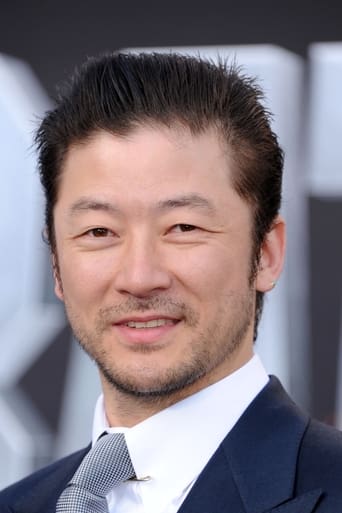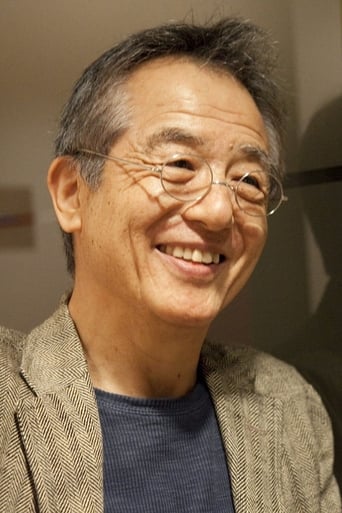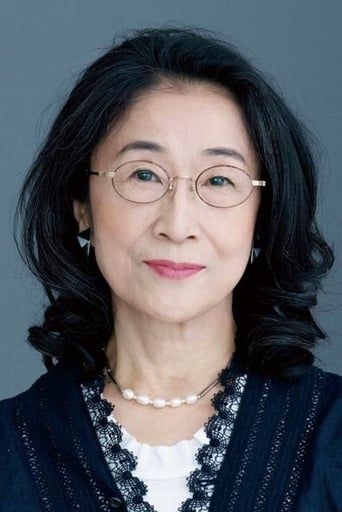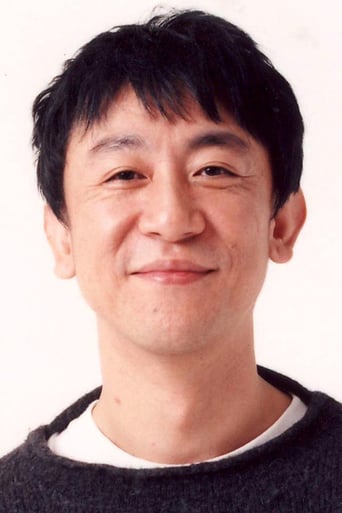Greenes
Please don't spend money on this.
Matialth
Good concept, poorly executed.
Neive Bellamy
Excellent and certainly provocative... If nothing else, the film is a real conversation starter.
Jenna Walter
The film may be flawed, but its message is not.
jzappa
Vital contains a single scene of such true, deep, tearjerking, aching love that despite all of its sleepy subtleties, it is truly great cinema. This scene makes you cry and relate to it, and only one who's ever been in deep, heavy, painful love with someone can watch it and understand what I mean. It's such stirring drama in one shot lasting about 5 minutes between two people, and you want that scene to last forever. I haven't felt any kind of emotion like that from a movie in God knows how long.There isn't much else to say about this film. Somehow, Tsukamoto has made a film so powerful based on one scene that is more emotional and moving than any work I've seen in nearly a year from many much much less dry filmmakers.
Scarecrow-88
A troubled, enigmatic amnesiac, Hiroshi(Tadanobu Asano), who lost his memory and beloved Ryôko(Nami Tsukamoto)in an accidental car crash, discovers that the one he's assigned to dissect in his medical class is her! Ikumi(Kiki), whose adulterous lover and medical professor committed suicide after she rejected his love towards her, desires Hiroshi but finds that he is overwhelmed by Ryôko's memory. Ryôko's memory unravels in Hiroshi's mind as he continues to dissect, articulate on paper every vital organ, and study her..it seems that, through this type of thorough examination, he can feel emotionally whole. There's this place he goes where Ryôko exists(imagine an ideal, idyllic beach setting or inside a forest whose beautiful, lush trees stretch endlessly towards the sky for miles)that feels so real, but it's a fabrication he will have to return from. This unhealthy obsession develops which engulfs his life..he grows more and more distant from the outside world as Ryôko takes center stage. It seems that Hiroshi was partaking in a form of sexual strangulation with Ryôko that he now continues with Ikumi, but when doing such a dangerous thing he seems to travel to the place where he's the most happy..where Ryôko awaits and wishes for him to stay. Everyone around Hiroshi are disturbed at his obsession with Ryôko's body as he often continues his dissecting work into the night causing discomfort towards the students assigned to her(he often harasses them by staring, charging at them when they clown around, or causes intense pressure when they seem to mess up)and the professors who believe he's too attached. By the time the class is over, only Ikumi remains there and that's because she loves him in an unhealthy way..it's as if she is competing, and losing, with a dead woman clinging to the hope Hiroshi will snap out of it. The question is, how do you let go when you are that close to someone? When that spirit of someone feels and seems to real that you wish to stay right where they are, how can one truly escape that? When life outside of Ryôko doesn't even have that same passion and joy, why would Hiroshi wish to leave her side? You know, this is a beautiful, challenging, and ultimately rewarding film about somehow letting go of the person you love when their memory comes rushing back to you. That overwhelming desire to hold them, love them, cherish them, and just cling them..I think, through this unusual and unique premise, that we experience those things through Hiroshi. Director Shinya Tsukamoto is quite multi-talented..he was in control of writing this very elusive work, editing it which wildly swings from reality into the fantasy created by the character Hiroshi, and beautifully photographing it. It's a stunning film, very moody and visually rich. The film does have very odd behavior by the central characters, mainly Hiroshi and Ikumi, who are dealing with their own obsessions and violent emotional tendencies and Tsukamoto doesn't hold back peering into their dementia. But, yet, despite their forays into the bizarre, this is still a very sad and effective tale of loss & acceptance that I found quite spellbinding. Very good performances from the male actors who played the fathers of Hiroshi and Ryôko, both deeply mournful of the loss of a young girl whose death was too soon.
Coventry
Not being the biggest fan of Shinya Tsukamoto's acclaimed cult favorites "Tetsuo" & "Tetsuo II", I was rather careful with my anticipations towards "Vital"; of which the DVD-box announces it as the director's latest masterpiece. Well it ain't no masterpiece, but it's definitely a compelling and suspense-packed thriller that I liked a whole lot better than the boisterous Tetsuo-films. Especially the basic story ideas are very ingenious and even original! The plot centers on the young Hiroshi Takagi who slowly recovers from a dramatic car accident in which his lost his whole memory and youthful spirit. The sight of a book about surgery suddenly makes him decide to study medicines, where he becomes somewhat of a strange outcast but with a natural talent to dissect corpses. Bit by bit his memory returns and Hiroshi comes to the painful establishment that he's performing an autopsy on his former girlfriend Ryôko, who died in the same accident and put her body at the disposal of the medical faculty. My main problem with "Vital" was that it quickly got tedious once Hiroshi realizes whose corpse he hacks up and - especially near the end - Tsukamoto inserts a lot of irrelevant dream sequences and images of scenic beauty. It actually would be a lot more effective and horrific as a short movie, I think. It's a fairly short film now (86 min.) but it would have been so much better as a part of trilogy like, say, "Three…Extremes" and exclusively focusing on Hiroshi's amnesia. Tsukamoto is clearly a gifted director who also knows a thing or two about cinematography. "Vital" is often beautiful to look at and loaded with symbolism. Worth watching.
gmwhite
Having seen Tsukamoto's Tetsuo films, Bullet Ballet and Tokyo Fist, I was initially taken aback by how restrained the presentation of this film was. There is very little of the frantic camera-movement and head-pounding sound of these films. And yet, the same intensity is there, quietly boiling away.The story revolves around Takagi, ex-medical student, who has woken from a coma. Though he remembers nothing, he is informed that his girlfriend died in the car crash. He walks around in a complete daze until happening upon some of his old textbooks. He becomes interested in medicine again and returns to med-school. Though still amnesiac, and visually far from 'firing on all cylinders', he does brilliantly in his studies, until confronted, during a dissection course, with the cadaver of his girlfriend Ryoko.*** Detailed discussion of plot points follows *** Before long, colourful visions of Ryoko and his time with her occur to him, often when he has blacked out in a game of strangulation with Kiki (a female student who is interested in him), a game which, it seems, he also used to play with Ryoko.Pointedly, however, these vivid visions seem to bear little relevance to the real Ryoko who, rather than a vivacious dancer had, in her grieving father's words, lost the light from her eyes years before, sometime in high-school. As the dissections - and visions - continue, Takagi reconstructs (or imagines) his time with Ryoko.For a film set largely in a dissection room, there is, however, very little actual gore. The director's intentions evidently lay elsewhere. Like his previous films, and also echoing one of Cronenberg's obsessions, the significance of flesh, of brute matter, is a question he returns to. Takagi's memories seem less than real (and they are filmed in such vibrant colour that they do seem too intense or too beautiful to be real). The only reality he can be sure of is the cadaver he is dissecting, piece by piece, and sketching in detail as a personal record.Other elements in the plot, however, lead one to question this reality also. Takagi, his face shrouded in long hair, barely utters more than grunts and looks as if still in a trance, and yet he is doing brilliantly in medical school. In one scene where all his classmates are wearing face masks, he alone appears uncovered. Other details also separate him from his classmates. Is it merely because of his amnesia and his obsession with Ryoko, or has he changed in other ways as well? Incidentally, his colleague and would-be girlfriend Kiki, is also quite disturbed by the dissection. She seems to play a role counterpointing, or paralleling that of the dead Ryoko, and her exact significance is something that demands thinking upon. I'm not suggesting that these are 'clues' to a real reading of the film, only that they are useful symbols for evaluating the characters, their moods, actions and motives.*** Detailed discussion of plot ended *** The photography was as brilliant as usual, with some superlative outdoor scenes, as well as blue and red filters it other shots. Tsukamoto somehow manages to make images that are immensely watchable, that just draw one's attention to them.As for the actors, Tadanobu Asano had relatively little to do besides brooding and wielding dissection tools. The female leads playing Kiki and Ryoko both did well, though they too were relatively untaxed in the acting department. As for the rest of the cast, the fathers of Ryoko and of Takagi stood out, humanising their roles even though of secondary importance. In fact, one might even suggest that the main actors were too close to the central enigma of the story to be fully developed as characters apart from it. The secondary roles, on the other hand, had more latitude to develop as people.I'd recommend this film to anyone already interested in Tsukamoto's growing body of work, or even to those who may have been put off by his louder and frantic works, but might be open to this quieter brand of intensity. Part story of loss, part philosophical inquiry into the nature of the flesh and the significance of memory, this film holds one's attention throughout and is not easily forgotten.





